EXCLUSIVE NORTH AMERICA & EUROPE AUTHORIZED REPRESENTATIVE OF THE SHIMADZU HYPER VISION LINE OF ULTRA HIGH-SPEED VIDEO CAMERAS
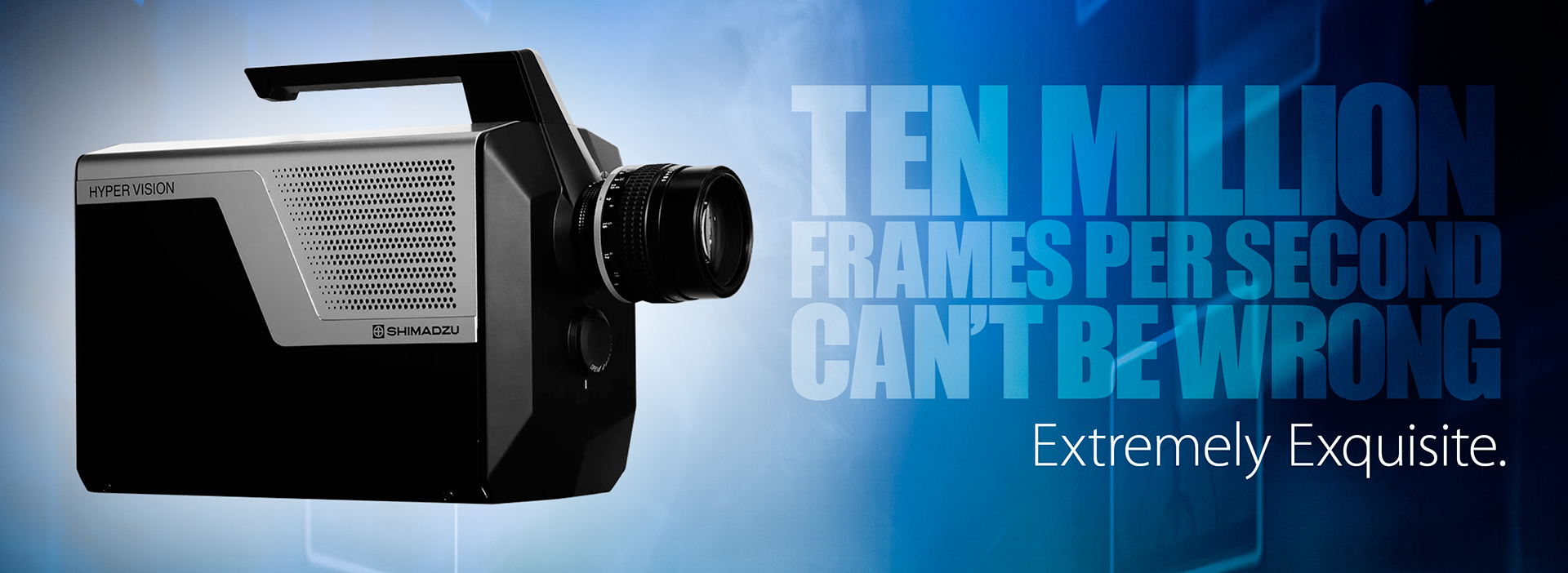
Shimadzu Hyper Vision HPV-X2
up to 10 million fps with 6x the sensitivity of conventional video cameras
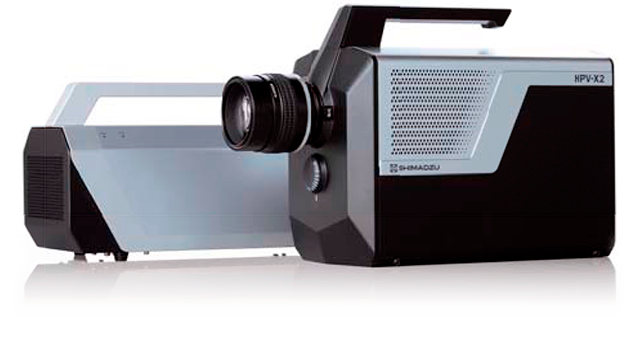
Shimadzu HPV-X2 & power supply
Setup. Control. Aquire.
Synchronize and operate multiple HPV-X2 cameras simultaneously for calibration and control using Correlated Solutions VIC-Snap Remote app for mobile devices and the VIC-3D™ System.
Extreme Sensitivity & Recording Speed – Best in its Class.
The HPV-X2 features a proprietary high-speed, high-sensitivity FTCMOS2 Advanced Next-Generation Burst Image Sensor, rated at ISO 16000 and captures 128 or 256 consecutive images at 1,000 to 10 million fps. The HPV-X2 connects to a PC laptop via Ethernet and supports various recording parameters combining numerous trigger and recording modes, including synchronization of multiple cameras for 3D DIC (digital image correlation). It truly is, the best in its class.
Visualization Technology:
A Driving Force Behind Science & Technology
Science and engineering have made dramatic progress thanks to visualization technology. Examples of visualization technology include the invention of microscopes, capable of enlarged observations of phenomena occurring in the microscopic domain, X-ray inspection systems, which enable the observation of images utilizing light at imperceptible wavelengths, and infrared cameras capable of recording thermal radiation (light wavelengths up to 14,000 nanometers), all invisible to the human eye,
Our eyes are incapable of capturing phenomena occurring at times shorter than 50 to 100 microseconds. As a result, high-speed video cameras are necessary in order to record phenomena occurring at intervals that cannot be seen with the human eye. The video can be replayed at a slower rate to visualize the high-speed phenomena. The Shimadzu Hyper Vision HPV-X2 ultra high-speed video camera is the industry standard tool for visualizing ultra high-speed domains in a variety of fields, such as academics, aerospace, automotive, electronics, government, industrial, materials testing, military, medical, scientific. sports, technology, and others.

Featuring the FTCMOS2 Advanced Next-Generation Burst Image Sensor
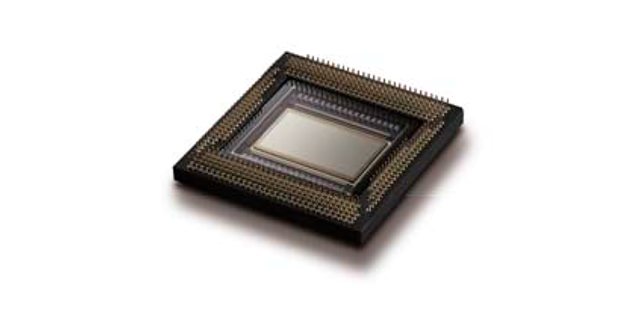
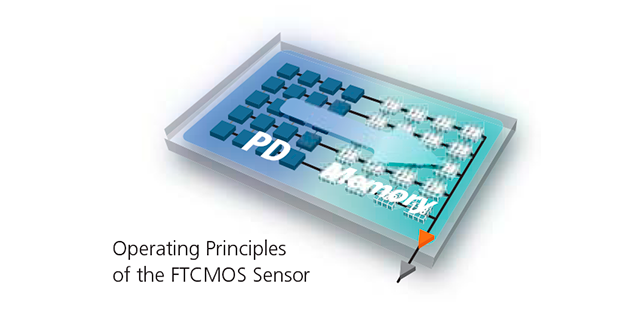
Burst Method Enables Ultra High-Speed Recording
Image storage memory is located outside the image sensor on typical high-speed video cameras. The number of signal output taps are extremely small compared to the number of pixels. Video signal transfer from pixels to memory is a sequential, serial process and ultra high-speed recording of more than 1 million frames per second can’t be achieved.
Shimadzu’s FTCMOS2 Advanced Next-Generation Burst Image Sensor has been engineered to match the number of on-board memory to frames recorded. Video signal transfer from pixels to memory is a seamless, parallel transfer, making it possible for ultra high-speed video recording up to 10 million frames per second and high-resolution video recording up to 5 million frames per second.
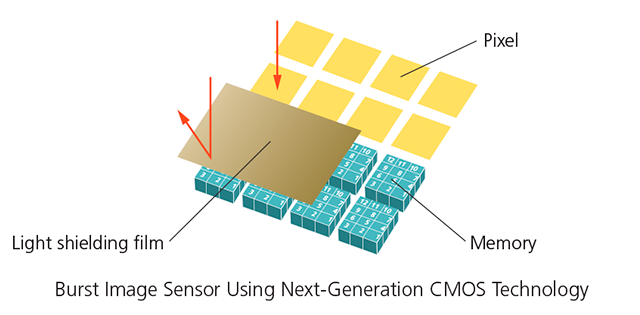
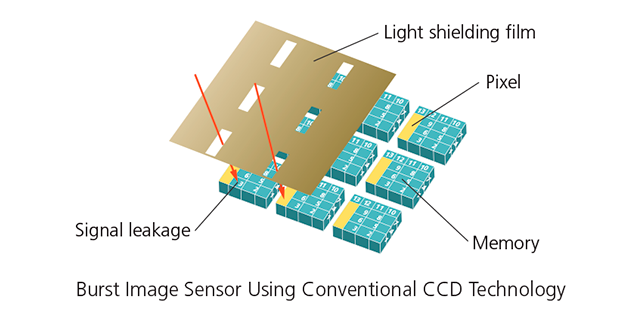
Next-Generation Burst Image Sensor Based on CMOS Technology
Memory is positioned next to pixels on conventional, CCD burst image sensors. Problems with signal leakage from pixels to memory usually produce poor quality images. Shimadzu’s FTCMOS burst image sensor utilizes CMOS technology, spatially separating pixels and memory, achieving superior, high quality images without signal leaks.
Shimadzu’s FTCMOS2 Advanced Next-Generation Burst Image Sensor’s light sensitivity is rated at ISO 16000 – six times greater than the FTCMOS sensor, thanks to the adoption of our incredible new CMOS process.
Note: FTCMOS and FTCMOS2 sensors were developed through collaborative research with Prof. Shigetoshi Sugawa of Tohoku University. Patents: 04931160, 04844853 & 04844854
Six Times Conventional Sensitivity with Improved Signal-to-Noise Ratio
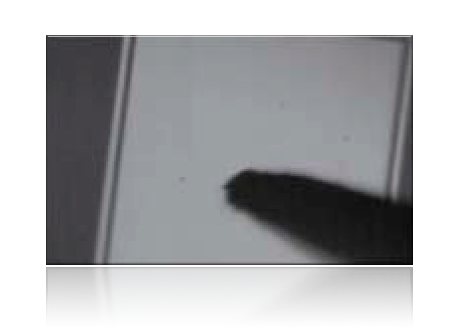
FTCMOS2 Advanced Next-Generation Burst Image Sensor
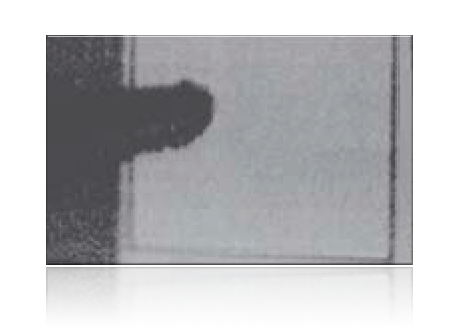
Conventional FTCMOS Image Sensor
ISO 16000
Improved Sensitivity
The light sensitivity of the HPV-X2 has been improved six-fold compared to our conventional products by adopting the FTCMOS2 Advanced Next-Generation Burst Image Sensor. The resulting improvement in signal-to-noise ratio yields clearer images compared to conventional products using the same optical system.
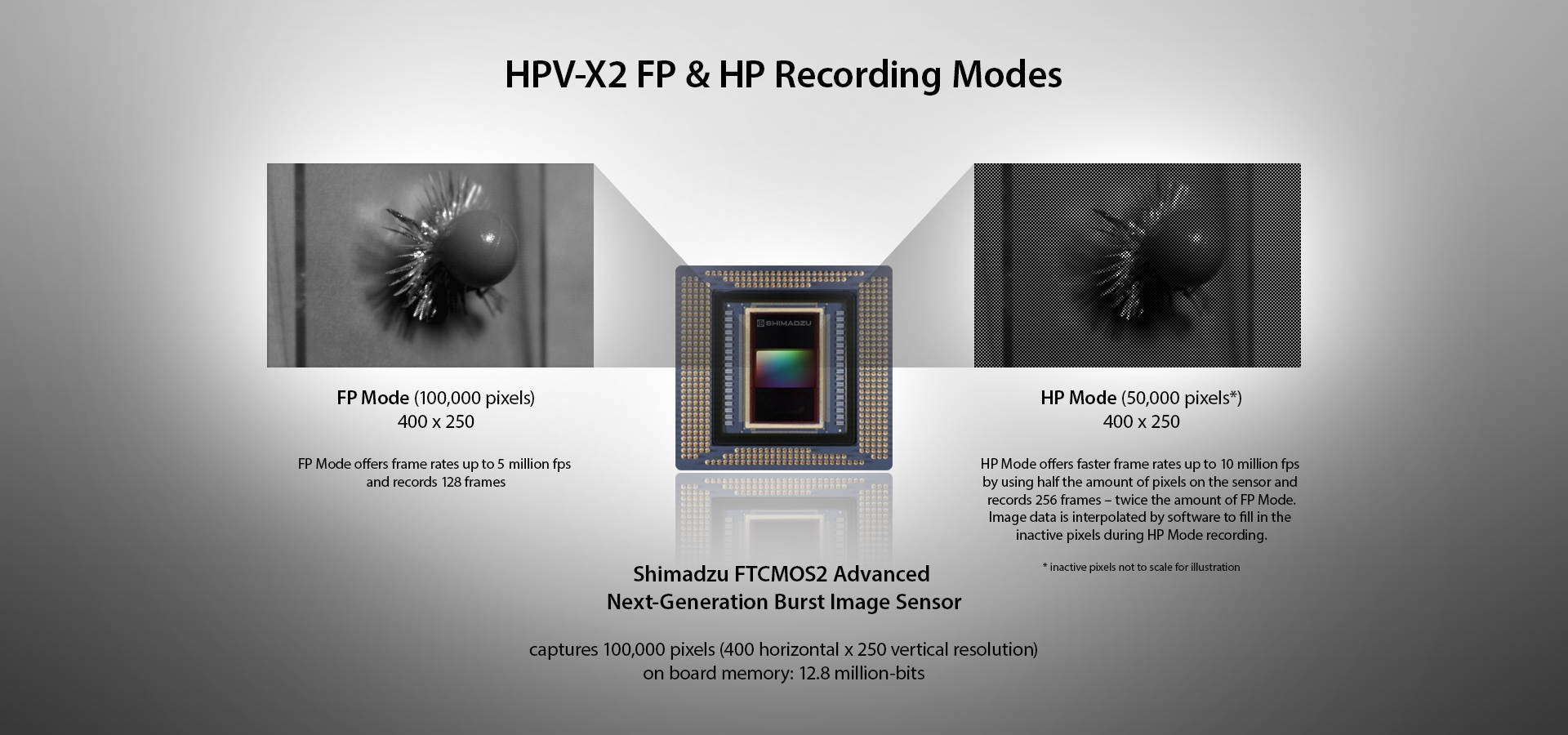
Digital Image Correlation (DIC)
High-Speed Synchronized Recording Using Two HPV-X2 Cameras
Accurate synchronized recording can be performed using two HPV-X2 ultra high-speed video cameras at frame rates up to 10 million frames per second for invaluable visualization results for analysis.
3D Image Analysis Capability
Synchronize and operate multiple HPV-X2 cameras simultaneously for calibration and control using Correlated Solutions VIC-Snap Remote app for mobile devices and the VIC-3D™ System.

Synchronized Recording of Carbon Fiber Reinforced Plastic (CFRP) Breakage Tensile Test
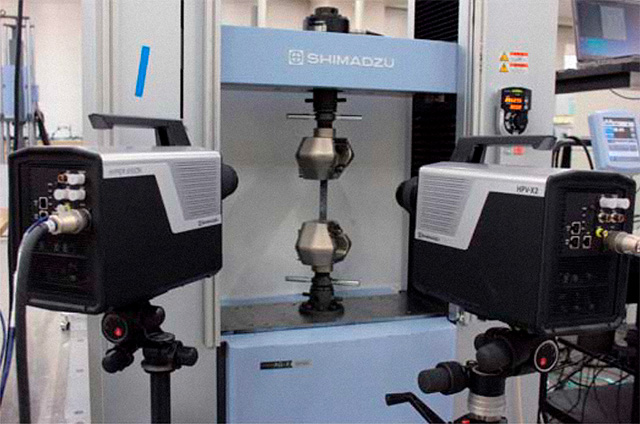
The Setup
Two HPV-X2 ultra high-speed video cameras positioned for DIC in front of Shimadzu’s AG-Xplus series precision universal testing machine.
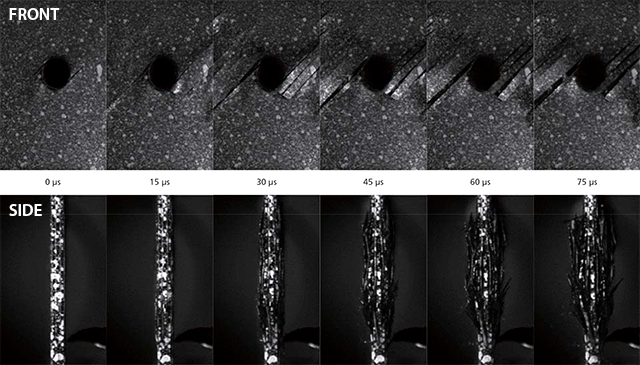
The Results
Front and side view image results from the CFRP breakage test.
Synchronized Recording Speed: 1 million frames per second
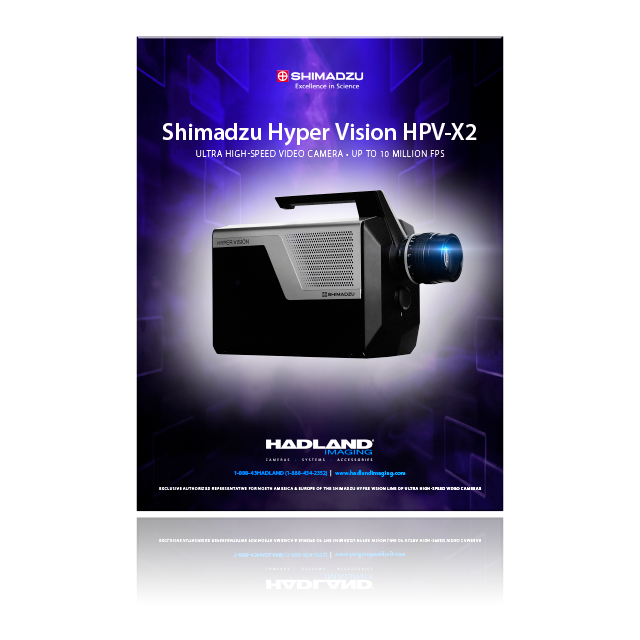
Ten Million FPS Can’t Be Wrong
Download the Shimadzu Hyper Vision HPV-X2 brochure PDF
Hyper Vision HPV-X2
Tech Specs
Specifications current as of July 2024 and are subject to change.
| Camera Head | |
|---|---|
| Lens Mount | Nikon F mount |
| Image Sensor | FTCMOS2 Advanced Next-Generation Burst Image Sensor – ISO 16000 |
| Recording Speed (frame rate) [1] | HP Mode: 10 million fps, 5 million fps (fixed) FP Mode: 5 million fps (fixed) both modes: variable recording speed between 60 fps – 2 million fps (1/10 ns steps) |
| Continuous Recording Capacity | HP Mode: 256 frames max FP Mode: 128 frames max |
| Resolution | HP Mode: 50,000 pixels (zigzag lattice pixel array) [2] FP Mode: 100,000 pixels (400 x 250 pixels) |
| Color/Gradations | Monochrome, 10-bits [3] |
| Exposure Time [4] | 10 million fps (fixed at 50 ns), 5 million fps (fixed at 110 ns) variable in 10 ns intervals starting from 200 ns in 60 fps – 2 million fps range |
| External Trigger Input | Two channels (TRIGIN, STANDBY) TTL level (5V), positive or negative polarity capability |
| Recording Mode | Internal, external & continuous triggers |
| Syncronization Function | Capable of synchronized recording with two cameras connected |
| Optional Outputs | Two channels (exposure start timing, trigger detection timing or other outputs depending on settings) |
| Trigger Point Setting | May be set to any frame from second frame onwards |
| Interface | One 1000 Base-T/100 Base-TX Ethernet port |
| External Monitor Output | NTC/PAL output |
| Data Memory Format | 10-bit dedicated format , BMP, AVI, JPG, TIF (8- & 16-bit formats supported) |
| Power Supply Unit | |
|---|---|
| Power Rating | Single phase 120V/220–230V, 200VA, 50/60Hz |
| Environmental Conditions | |
|---|---|
| Operating Temperature Range | 41° to 104° F (5° to 40° C) |
| Operating Humidity Range | 35–75% RH with no condensation |
| Storage Temperature Range | 32° to 122° F (0° to 50° C) |
| Storage Humidity Range | 20–80% RH with no condensation |
| Size & Weight | |
|---|---|
| Camera Head | 6.3 x 13 x 10.24 inches (160 x 330 x 260 mm) ~14.1 lb (6.4 kg) |
| Power Supply Unit | 5.9 x 15.43 x 7.28 inches (150 x 392 x 185 mm) ~11.46 lb (5.2 kg) |
| Cable Length – camera to computer | ~6.56 ft (2m) |
| Cable Length – camera to power supply unit | ~9.18 ft (2.8m) |
| Control PC Specifications | |
|---|---|
| OS | Windows® 7 Professional (64-bit) Service Pack 1 or later |
| CPU | Intel Core i5 or greater |
| Memory | 4GB or greater |
| HDD | 250GB or greater |
| Screen Dimensions | 1366 x 768 pixels or greater |
| Interface | 1000BASE-T/100BASE-TX Ethernet |
| External Recording Device | DVD-RW |
| Input Devices | Mouse & keyboard |
[1) The recording speed is a reference value. It is not guaranteed to be an accurate value for the time interval between recording frames.
[2] Stored images will be 400 × 250 pixels.
[3] 10-bit refers to the data format. It does not indicate a guarantee of data precision.
[4] Exposure times are rough indications and are not guaranteed as exact exposure time ratios for all recording speeds.
What are you waiting for?
Press the button already or call 1-888-43HADLAND (1-888-434-2352) to get your HPV-X2 (or at least find out more information).
Get 2 for 3D DIC!
